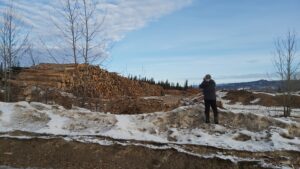
Houston pellet mill, Photo: Bulkley Valley Stewardship Coalition
Joint investigation into wood sourcing for Drax pellet mills in British Columbia by Conservation North, Bulkley Valley Stewardship Coalition and Biofuelwatch
Drax Group Plc is a UK-based company that operates the world’s biggest biomass power station, and is also the world’s second biggest pellet producer, after Enviva. Drax burns pellets from its own production at Drax power station in England, and sells pellets to other companies, mostly in Japan.
Drax owns seven pellet mills in British Columbia (BC) after acquiring the province’s largest pellet producer, Pinnacle Renewable Energy Inc., in 2021. Its BC pellet mills produced over 1.3 million tonnes of pellets in 2021, accounting for almost 40% of Canada’s total pellet production. Drax sources its raw material from BC’s forests and forest industries, and maintains that its operations in BC are “sustainable.
This analysis focuses on north-central BC, where all of the material feeding Drax’s pellet mills there originates from Primary forest, whether it arrives directly from logging operations or as byproduct from near-by sawmills. The vast majority of commercial logging taking place in BC is of Primary forest.
In BC, Old Growth is Primary forest that has reached an advanced age and consists of communities of plants, animals and other life forms that have lived together long enough to develop complex, interconnected relationships. Productive Old Growth forest with large trees covers only 3% of the province, and is now very limited because of a century of logging, mostly for sawlogs and pulp.
In 2021, the government of BC convened a technical committee to identify and map Old Growth forest types, including the rarest Old Growth forest types that are at high and near-term risk of irreversible biodiversity loss if they are logged.
These rare Old Growth forest types were recommended by the technical committee for short-term protection from logging and are referred to collectively as Priority Deferral Areas. The committee identified three categories of rare Old Growth with the highest risk of being logged over the short-term: Remnant Old Growth, Ancient Forest, and Big-treed Old Growth.
In 2020, northern BC-based community group Conservation North documented the issuing of Primary forest logging licences by the BC government to pellet companies. In 2022 BBC Panorama and CBC Fifth Estate investigations revealed that Drax was logging rare Old Growth forest and other Primary forest in BC. This investigation examines the extent to which Drax’s pellet mills are still sourcing logs for its pellet production from irreplaceable Old Growth forests, particularly Priority Deferral Areas.
